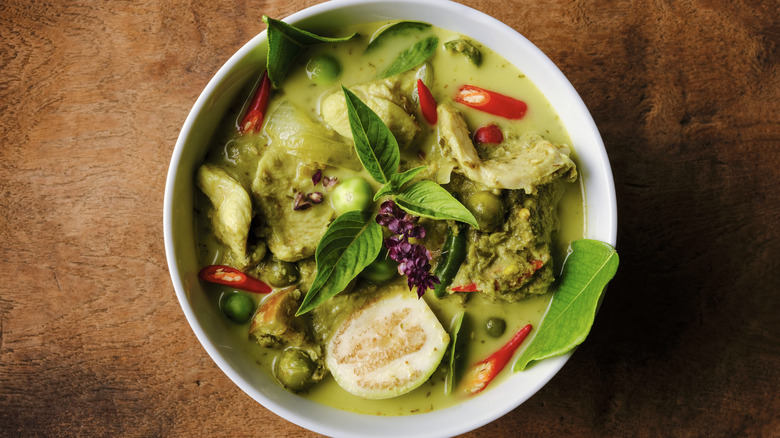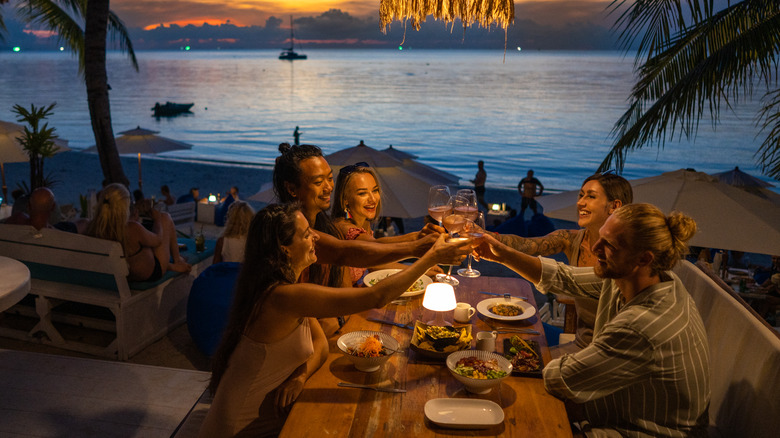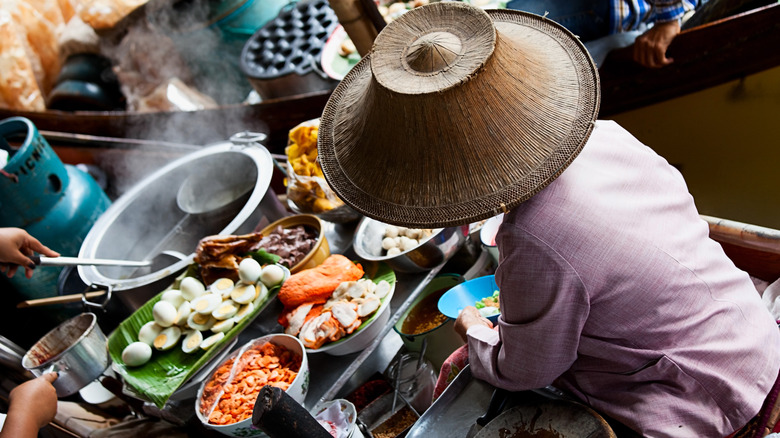How Gastrodiplomacy Brought Thai Food To The World Stage
Even if you've never been to Thailand, you've likely snacked on some tasty Thai food in your life. Pad thai and pad see ew dishes are not just well-known, they're practically mainstream, served in pubs, cafes, diners, and other establishments around the world. Even Peter Parker indulges in larb, a traditional dish from Northern Thailand, in a recent Spider-Man movie. The proliferation of Thai cuisine around the world is largely due to Thailand's attention to gastrodiplomacy, a term coined by researcher Paul Rockower.
In 2002, the Thai government launched the Global Thai initiative to increase interest in Thai cuisine, cast a positive light on Thailand, generate tourism, and scale up the country's food and labor exports. The initiative called for the creation of thousands of new Thai restaurants around the world and the creation of the "Thai Select" label. The label is reserved for restaurants that hire government-trained chefs from Thailand, import their ingredients from Thailand, and serve authentic Thai dishes.
Initiatives like this can protect and showcase regional cuisines on an international level and provide a source of national pride for local citizens. It can also promote general goodwill and soften otherwise tenuous diplomatic relations when leaders sit down over a well-loved dish.
Pros and cons of gastrodiplomacy
Thailand's gastrodiplomacy efforts involve several government departments and encompass a number of ambitious initiatives. The Export-Import Bank of Thailand offered up to $3 million in loans for Thai nationals looking to open a restaurant abroad. Before the program began, there were roughly 5,500 Thai restaurants worldwide. In the following 10 years, that number jumped to over 10,000 Thai restaurants around the world. By 2014, nearly a quarter of all restaurants in Australia served Thai cuisine. In the U.S., there are roughly 300,000 Thai-Americans, but an estimated 5,300 Thai restaurants in the country, giving the highest population-to-restaurant ratio of any other ethnic cuisine. Also, New Zealand has created a special visa for Thai chefs in the country.
One key to Global Thai's success has been the way the Thai government adapts its program to target the regions it hopes to grow in. The Department of Export Promotion made efforts for culinary expansion in very specific regions by conducting market research on local tastes and adapting recipes for regional palate preferences. Because of these efforts in the Middle East, Thailand is now one of the top five exporters of halal food in the world.
The government also earmarked funds for more specific purposes, like marketing galangal root and other spices abroad. Even the Public Health Ministry got in on Global Thai by publishing a book for Thai chefs going abroad.
Limitations of gastrodiplomacy
These programs were effective in increasing the popularity of Thai cuisine and led to an increase in tourism. It is estimated that for every million people who dine at a Thai restaurant globally, roughly 100,000 will eventually visit Thailand. Since Global Thai started, there was a 200% increase in tourism to Thailand, with nearly a third of new tourists saying food was a critical reason for their trip.
While gastrodiplomacy has many positive benefits, it has its limitations. Foreigners can have a singular vision of what Thai cuisine should look, taste, and smell like, which forces Thai restaurants to lean on cultural inaccuracies — like the utilization of chopsticks. Restaurants may change their recipes by pulling back on the spices and cooking with the more widely accepted soy sauce instead of the more traditional fermented fish sauce. Even pad thai — named as Thailand's national dish thanks to the efforts of the Global Thai initiative — is largely catered to non-Thai palates and has little cultural history within the country.
Still, culinary diplomacy is an important tool for governments to leverage. In a study conducted by Public Diplomacy Magazine, over half of those surveyed said eating a country's cuisine leaves them with more positive feelings toward that country. Two-thirds of the respondents also felt that countries in active conflict would likely benefit from gastrodiplomacy programs. Though many other countries have started their own culinary initiatives, Thailand's gastrodiplomacy efforts remain the most robust.



